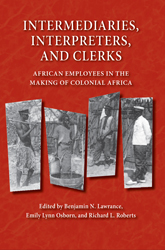Intermediaries, Interpreters, and Clerks
African Employees in the Making of Colonial Africa
Edited by Benjamin N. Lawrance, Emily Lynn Osborn, and Richard L. Roberts
Africa and the Diaspora: History, Politics, Culture
Thomas Spear, Neil Kodesh, Tejumola Olaniyan, Michael G. Schatzberg, and James H. Sweet, Series Editors
“This volume . . . sets an agenda for a new and nuanced understanding of
how Africans figured in the making of colonial Africa. . . . These studies not
only establish the agency of African intermediaries but also narrate, assess,
and contextualize it.”
—Philip S. Zachernuk, African Studies Review
As a young man in South Africa, Nelson Mandela aspired to be an interpreter or clerk, noting in his autobiography that “a career as a civil servant was a glittering prize for an African.” Africans in the lower echelons of colonial bureaucracy often held positions of little official authority, but in practice these positions were linchpins of colonial rule. As the primary intermediaries among European colonial officials, African chiefs, and subject populations, these civil servants could manipulate the intersections of power, authority, and knowledge at the center of colonial society.
By uncovering the role of such men (and a few women) in the construction,
function, and legal apparatus of colonial states, the essays in this volume highlight
a new perspective. They offer important insights on hegemony, collaboration, and
resistance, structures and changes in colonial rule, the role of language and education,
the production of knowledge and expertise in colonial settings, and the impact
of colonization in dividing African societies by gender, race, status, and class.
Benjamin N. Lawrance is Professor of African History at the University of Arizona. Emily Lynn Osborn is an associate professor of history at the University of Chicago. Richard L. Roberts is the Frances and Charles Field Professor of History and codirector of the Center for African Studies at Stanford University.
Praise
“Intermediaries, Interpreters, and
Clerks has its greatest strength in the
diverse vignettes of life across Africa
under a variety of colonial regimes
and through nearly two centuries of
history.”
—James E. Genova, Journal of
Colonialism and Colonial History
Publicity and Press Kit Resources
Click here for current & upcoming UW Press events
Download high resolution cover, color
Download high resolution cover, b/w
Media & bookseller inquiries regarding review copies, events, and interviews can be directed to the publicity department at publicity@uwpress.wisc.edu or (608) 263-0734. (If you want to examine a book for possible course use, please see our Course Books page. If you want to examine a book for possible rights licensing, please see Rights & Permissions.)
Of Related Interest
|

Education as Politics
Colonial Schooling and Political Debate in Senegal, 1850s–1914
Kelly M. Duke Bryant |
|

Paperback, August 2015
LC: 2006008596 DT
342 pp. 6 x 9
4 maps, 2 b/w figures
|

